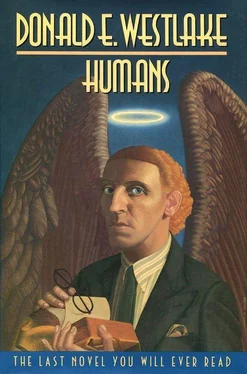Most of the firemen who were first to reach the Chernobyl nuclear plant that night, the local ones, were already dead. Some became quite sick, but survived, and a very few seemed not to be harmed at all by the experience, except for the temporary loss of their hair. Among the later fire companies to arrive, those who had at least received some warning of the dangers, deaths were fewer but illness more widespread. Why some people died while others lived, why some were terribly ill but others were not, was a primary concern of the doctors at the Bone Disease Research Clinic. Grigor, a survivor thus far but among the doomed, a young and healthy bachelor willing to be experimented on, was the perfect specimen for their purposes.
It was while signing the release papers at the hospital in Kiev that Grigor made his first joke: “Well, at least now I’ll be able to read in bed without turning on the light.”
The doctor and nurse in attendance on him, to help him fill out the forms, were both shocked. The doctor, as young as Grigor with some Asiatic flatness in his face — Uzbek, perhaps — frowned down at the papers and muttered, “Hardly something to make jokes about.”
“For you, no,” Grigor told him. “But for me, yes. I am permitted.” And he suddenly smiled, an honest joyful sunny smile. “I am the only one permitted,” he told them, and felt some great tight-clenched muscle deep inside himself relax, a muscle he’d never known was there until it released its clamp on his guts. The only one permitted.
At first his jokes were concerned exclusively with himself — “The best thing about all this is, I can no longer find my bald spot” — but once he’d settled into the routine at the clinic and started taking an interest in the television news (so much more news than there used to be), his subject matter broadened and the people around him began to respond more comfortably to his jokes.
It was a doctor at the clinic, one who had an old classmate with a girlfriend at Moskva Film, who encouraged Grigor to write down the jokes and comments that came to him with such increasing frequency. The girlfriend at Moskva Film turned out to be the wrong person, but she knew someone who knew someone, and by a frail web of relationships two pages of badly typed Grigor Basmyonov jokes eventually found their way to Boris Boris, who said, “I’ll buy this one, this one, this one, and that one. The rest I spit on. Who does this person think he is?” And so their relationship began.
The first time Grigor and Boris Boris met, when Grigor was made a staff writer rather than a mere contributor, they became friends at once, because it turned out Boris Boris was permitted as well; the only other person permitted. Grigor walked into the sunny office in his neatly pressed suit and gleaming round bald head, and Boris Boris looked at him and said, “If I had a crystal ball like that head, I could see into the future.”
“I can see into the future,” Grigor told him. “I’m not there.”
Boris Boris laughed and clapped his hands together and said they should have a drink, which they did.
Grigor himself was not a television personality, nor would he ever become one. His name was on the program’s credits, that was all. In the first place, the government would never permit such public acknowledgment that this gallows humor rose from its own most egregious attack on the Russian people. And in the second place Boris Boris would never permit it: “Nobody tugs at heartstrings around here but me. I keep that to fall back on in case these miserable jokes of yours fail to do the job.”
But the jokes did their job, most of them, and roubles accumulated in a bank account with Grigor’s name on it, pointless roubles he would never have the time or the inclination to spend nor a person to will them to; as though he were a hungry cat locked in a cabbage field.
The work, however, was its own pleasure, and all in all Grigor’s only objection to his life was its anticipated brevity. He made up jokes, he edited the jokes of others, he drank sometimes with Boris Boris, and he enjoyed watching Boris Boris use the material on television. “You make it all sound much funnier than I do,” he told Boris Boris once, early in their friendship, and Boris Boris replied, “That’s my genius, to make something out of something. Your genius is to make something out of nothing, or I’ll kick you downstairs.”
That was the work. For the rest of it, life was uncomplicated and fairly content. He took his medicine every four hours, not with any anticipation of a cure, but because it would assist the doctors in their researches. He was their field of study, just as the array of news programs and the minute shifts and adjustments in the social order was his field of study. One of his fields of study.
The other was Chernobyl. He knew what had been done to him, but now he wanted to know how it had been possible. As the months and years went by, more and more was generally known about what had happened there, and more and more was publicly acknowledged. Grigor studied the magazine articles and books, watched the television programs, and learned so much about the plant he could almost have run it himself. Except that he wouldn’t have run it; he’d have shut it down.
There were flaws in the design, that was finally admitted. Beyond that, there were flaws in the maintenance of the plant, flaws in the administration, flaws in the ordinary everyday procedures of running the place. Ultimately, Chernobyl had been operated as though nothing could ever possibly go wrong, no matter how sloppy or ignorant its servants became. Nothing could go wrong because nothing ever had gone wrong. And that was another fine joke: a nuclear plant, the most modern sort of enterprise on the planet, run by superstition and magic.
Was there a way to make a joke out of that, Merlin at the helm of the nuclear plant? No. It was old hat, for one thing, stale news, no longer of interest to anybody except a few leftovers like Grigor and their attentive doctors. Boris Boris would reject such a joke out of hand, and he’d be right.
Grigor was just easing back into sleep, comforted by this thought (that the world goes on, the world goes on), when the knocking sounded at the door. Surprised — the patients’ sleep was never disturbed — Grigor sat up and switched on the bedside light, and the time was six minutes past four. They’ve discovered a miracle cure! Couldn’t wait another second to tell me! Smiling at his own manic optimism — like a thirteen-year-old’s cock, it rose at the most inconvenient moments — Grigor got out of bed and padded across the room to see what this really was.
Opening the door, Grigor saw a fellow patient, a man in the striped pajamas and green robe of the clinic, with heavy brown wool socks on his feet and a square pale envelope in his hand. “Grigor,” he said, voice hushed because of the hour, “I won’t come in. I just wanted to give you this.” And he extended the envelope.
Automatically taking it, trying to remember which of his fellow patients this was, Grigor said, “What are you doing up so late, uhhhh?” Trailing off because he was unable to remember the man’s name. The corridor night-lights offered very little illumination, and his own body blocked the faint gleam from his bedside lamp; the man was familiar, of course, but Grigor couldn’t quite make out which particular fellow guinea pig this was. “Very late,” he repeated, hoping for a clue from the man’s voice.
“We must be on the same medicine,” the man answered, in a perfectly ordinary and non-specific voice. “I heard your alarm just after mine, and thought you’d be the perfect person for this invitation. I can’t go, you see.”
Читать дальше






